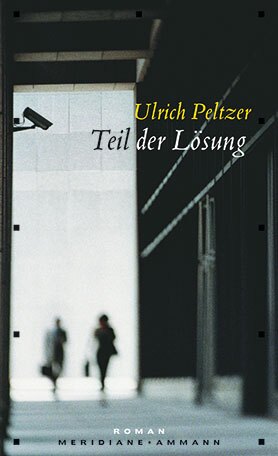Fiction
Ulrich Peltzer
Teil der Lösung
[Part of the Solution]
Review
Berlin in the summer of 2003: sunshine for weeks on end, weather to fall in love in. And that’s just what the main character does in Ulrich Peltzer’s acclaimed novel Teil der Lösung. His name is Christian Eich, he’s in his mid-30's and he just about gets by as a free-lance journalist in Berlin. Between bar and university he keeps on bumping into a young woman called Nele and finally he falls in love with her. Nele is writing an MA dissertation for Jakob, an old school friend of Christian, who is now an ambitious university teacher. It’s on the exemplary deconstructivist topic of “Jean Paul as Text Catapult” (Jean Paul was an important novelist and satirist of the Romantic period) and, at home in the environment of the university, she’s determinedly pursuing an academic career. Unlike Christian she knows very well what she wants from life - and above all, what she doesn’t want.
Nele, and it’s a long time before Christian finds out, is a member of a left-wing group of activists, resisting with more or less militant actions the increasing control of all spheres of life by state and commercial institutions. For example, they perform street theatre in clown costumes at a symbolic location of global capitalism like the Sony shopping and entertainment centre, drawing attention to the omnipresent surveillance cameras. In addition to such relatively good-natured activities a growing radicalisation is also evident in the group. As protest against fare rises ticket machines in underground stations are damaged, on another occasion vehicles are set alight; and so the members of the group come to the attention of the security services. Undercover agents incite the group to further illegal actions.
It’s here that the special quality of Peltzer’s narration is evident. His narrator does not pass judgment, does not take sides. Instead he employs a language of objectivity, which records matter-of-fact observations and carefully registers even the smallest impulses. Thus he is convincingly able to demonstrate how the violence of state and rebels are linked and are ultimately even dependent on one another to legitimate their actions.
Christian for his part - although in many respects much more disillusioned than Nele and her fellow-activists - likewise indirectly expresses his unease at social pressures to conform, by refusing the middle class lifestyles of many of his contemporaries, as embodied by his friend Jakob with his career, wife and children. Without a steady job, without a permanent home or a clear vision of his own future Christian seems in many respects directionless, yet at the same he is also closer to his own ideal of being freed to change his path through life at any time.
Through this central character Peltzer shows the attraction of a life outside middle class norms, but simultaneously demonstrates its risks and limits. Because both in his private as in his professional life Christian lives in a state of unlimited possibilities and consequently also in a state of constant indecisiveness. Often life simply seems to rush past him: “He knew what he had to do in the coming days, even tomorrow, yet he was unable to put things in a practical sequence, where to start and how to go on.” Consequently Christian somewhat reluctantly keeps his head above water, financially speaking, with contributions to a restaurant guide. His real interest, however, is an article he is writing - without yet having a taker for it - about former members of the Italian “Red Brigades”, who after living in France for thirty years are now suddenly to be expelled. As he writes to Nele he is concerned with “the things [...], which allow something to become apparent beyond individual fates”, about “[...] the people behind history, [...] in this case also the obviousness, with which they are turned into pieces in an already fixed game. they are made use of for purposes which have nothing to do with the actual accusations against them. personally and historically, although both spheres are mixed up together and can hardly be unravelled in the trajectories of the armed struggle of the 70's and 80's.”
Through Christian and Nele and their different forms of political commitment, but also by way of many subsidiary figures in a precarious academic and intellectual milieu, Peltzer graphically shows us the surface of city life in the 21st century. He also describes with atmospheric density the efforts of individuals to find a path between freedom, conformity and resistance; that almost automatically raises the question, what form of opposition to a system experienced as restrictive is at all possible in the present and above all promises to be successful in the long term.
With Teil der Lösung has not only written a wonderful love story, which shows how the unequal couple Christian and Nele come together despite all the differences of generation and character, but also a decidedly political novel saturated with present-day realities. It owes its impression of authenticity not least to Peltzer’s cinematic fast cutting and the precise evocation of milieus and discourses.
His keen observations of urban life are enriched with many concrete features specific to Berlin, but they are representative of comparable phenomena in most contemporary cities. Ultimately, however, this Berlin novel is concerned with the question of the credibility of both individual and social thought and action and so simultaneously with the global question, to what extent the pressures of a flexible economy and way of life are in conflict with romantic ideas of a better life and of the alteration of existing conditions.
Translated by Martin Chalmers


